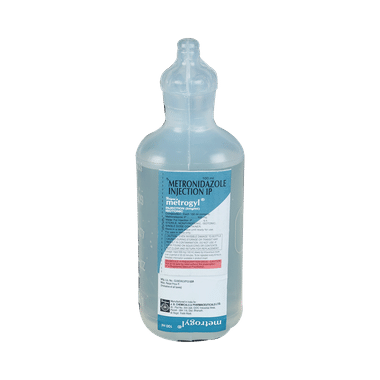-
Bygyl 500mg Infusion (Rs.20.58)
Composition: Metronidazole (500mg)
-
Metrodac 500mg Infusion (Rs.10.62)
Composition: Metronidazole (500mg)
-
Metroven 500mg Infusion (Rs.13.18)
Composition: Metronidazole (500mg)
-
Metronex 500mg Infusion (Rs.22.4)
Composition: Metronidazole (500mg)
-
Fresogyl Infusion (Rs.22.05)
Composition: Metronidazole (500mg)
-
Meterkem 500mg Infusion (Rs.11.7)
Composition: Metronidazole (500mg)
-
Metrozee Injection (Rs.24.64)
Composition: Metronidazole (500mg)
-
Flagyl 0.5% Solution for Infusion (Rs.22.05)
Composition: Metronidazole (500mg)
-
Metro 500mg Infusion (Rs.12.08)
Composition: Metronidazole (500mg)
All Details About MEtrogyl Injection
Find out detailed description, uses, directions of use, side effects, warnings and precautions, frequently asked questions about MEtrogyl Injection
Description:
MEtrogyl Injection is an antibiotic medicine that helps your body fight infections caused by bacteria and parasites. It is used to treat infections of the liver, stomach, intestines, vagina, brain, heart, lungs, bones and skin.MEtrogyl Injection helps prevent an infection after surgery. It is also used in the treatment of dental infections, leg ulcers, and pressure sores. This injection is administered under the supervision of a healthcare professional. It should be taken at the same time each day to get the most benefit. Your symptoms may get better after a short time but do not stop taking it until you have finished a full course of treatment, even if you feel well. If you stop taking it early, some bacteria may survive, and the infection may come back. Do not drink any alcohol while taking this medicine, and for a few days after stopping it. Otherwise, you may get unpleasant side effects like nausea, vomiting, and stomach pain.
The most common side effects of this medicine are muscle pain (myalgia), dryness in the mouth, swelling and heaviness of tongue (glossitis), and painful swelling and sores in the mouth (stomatitis). These are usually mild but let your doctor know if they bother you or last more than a few days. You can try using sugarless candies or lozenges to overcome any dryness or metallic taste in the mouth.
Earlier using this medicine, inform your doctor if you are allergic to any medicine or have any kidney or liver problems or any disease of the nervous system. This medicine should not be taken if you are pregnant or breastfeeding unless it is absolutely necessary and prescribed by your doctor. It may cause unusual results with certain medical tests. Therefore, tell any doctor who treats you that you are using this medicine.
Uses:
- Treatment of Bacterial infections
- Treatment of Parasitic infections
Directions For Use:
Your doctor or nurse will give you this medicine. Compassionately do not self administer.Side Effects:
Most side effects do not require any medical attention and disappear as your body adjusts to the medicine. Consult your doctor if they persist or if you’re worried about themOrdinary side effects of MEtrogyl
- Nausea
- Headache
- Dryness in mouth
- Metallic taste
Warning & Precautions:
If a single dose of MEtrogyl Injection is used, it is recommended to hold breastfeeding for 12-24 hours to allow the removal of the drug.
MEtrogyl Injection may make you feel sleepy, dizzy, confused. You may have hallucinations, fits (convulsions) or temporary eyesight problems (such as blurred or double vision) affecting your ability to drive.
Tolerants undergoing kidney dialysis should take this medicine after the dialysis treatment.
FAQs:
How long does MEtrogyl Injection take to work?
How is MEtrogyl Injection administered?
Can I drink alcohol while using MEtrogyl Injection?
Can the use of MEtrogyl Injection cause metallic taste?
What if I take more than the recommended dose of MEtrogyl Injection?
What if there is no improvement after using MEtrogyl Injection?
Written by:
Dr. T. Sharmila Krishna
M.B.B.S., MD (Biochemistry)
Reviewed by:
Dr. Sureshbabu Yadav
M.B.B.S., DIP.DIAB, F.R.S.H
Disclaimer:
Getomeds primary intention is to ensure that its consumers get information that is reviewed by experts, accurate, and trustworthy. The information and contents of this website are for informational purposes only. They are not intended to be a substitute for professional medical advice, diagnosis, or treatment. Please seek the advice of your doctor and discuss all of your concerns about any disease or medication. Do not disregard or postpone seeking professional medical advice because of something you read on Getomeds. Our mission is to support, not replace, the doctor-patient relationship.
